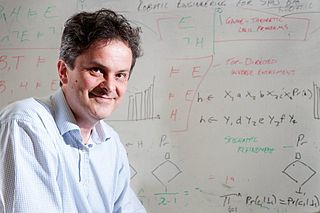Related Research Articles
Logic programming is a programming, database and knowledge-representation and reasoning paradigm which is based on formal logic. A program, database or knowledge base in a logic programming language is a set of sentences in logical form, expressing facts and rules about some problem domain. Major logic programming language families include Prolog, Answer Set Programming (ASP) and Datalog. In all of these languages, rules are written in the form of clauses:

A programming language is a system of notation for writing computer programs. Most programming languages are text-based formal languages, but they may also be graphical. They are a kind of computer language.
Prolog is a logic programming language associated with artificial intelligence and computational linguistics.
A specification language is a formal language in computer science used during systems analysis, requirements analysis, and systems design to describe a system at a much higher level than a programming language, which is used to produce the executable code for a system.
Logic for Computable Functions (LCF) is an interactive automated theorem prover developed at Stanford and Edinburgh by Robin Milner and collaborators in early 1970s, based on the theoretical foundation of logic of computable functions previously proposed by Dana Scott. Work on the LCF system introduced the general-purpose programming language ML to allow users to write theorem-proving tactics, supporting algebraic data types, parametric polymorphism, abstract data types, and exceptions.

In computer science, model checking or property checking is a method for checking whether a finite-state model of a system meets a given specification. This is typically associated with hardware or software systems, where the specification contains liveness requirements as well as safety requirements.
The Fifth Generation Computer Systems was a 10-year initiative begun in 1982 by Japan's Ministry of International Trade and Industry (MITI) to create computers using massively parallel computing and logic programming. It aimed to create an "epoch-making computer" with supercomputer-like performance and to provide a platform for future developments in artificial intelligence. FGCS was ahead of its time, and its excessive ambitions led to commercial failure. However, on a theoretical level, the project spurred the development of concurrent logic programming.
In programming language theory, semantics is the rigorous mathematical study of the meaning of programming languages. Semantics assigns computational meaning to valid strings in a programming language syntax. It is closely related to, and often crosses over with, the semantics of mathematical proofs.
A fifth-generation programming language (5GL) is a high-level programming language based on problem-solving using constraints given to the program, rather than using an algorithm written by a programmer. Most constraint-based and logic programming languages and some other declarative languages are fifth-generation languages.

Ehud Shapiro is an Israeli scientist, artist, and entrepreneur, who is Professor of Computer Science and Biology at the Weizmann Institute of Science. With international reputation, he made fundamental contributions to many scientific disciplines, laying in each a long-term research agenda by asking a novel basic question and offering a first step towards answering it, including how to computerize the process of scientific discovery, by providing an algorithmic interpretation to Karl Popper's methodology of conjectures and refutations; how to automate program debugging, by algorithms for fault localization; how to unify parallel, distributed, and systems programming with a high-level logic-based programming language; how to use the metaverse as a foundation for social networking; how to devise molecular computers that can function as smart programmable drugs; how to uncover the human cell lineage tree, via single-cell genomics; how to support digital democracy, by devising an alternative architecture to the digital realm.
Alma-0 is a multi-paradigm computer programming language. This language is an augmented version of the imperative Modula-2 language with logic-programming features and convenient backtracking ability. It is small, strongly typed, and combines constraint programming, a limited number of features inspired by logic programming and supports imperative paradigms. The language advocates declarative programming. The designers claim that search-oriented solutions built with it are substantially simpler than their counterparts written in purely imperative or logic programming style. Alma-0 provides natural, high-level constructs for building search trees.

In computer science and mathematical logic, a proof assistant or interactive theorem prover is a software tool to assist with the development of formal proofs by human-machine collaboration. This involves some sort of interactive proof editor, or other interface, with which a human can guide the search for proofs, the details of which are stored in, and some steps provided by, a computer.

John Charles Reynolds was an American computer scientist.
CHIP is a constraint logic programming language developed by M. Dincbas, Pascal Van Hentenryck and colleagues in 1985 at the European Computer-Industry Research Centre (ECRC), initially using a Prolog language interface. It was the first programming language to implement constraint programming over finite domains, and subsequently to introduce the concept of global constraints.
The Alvey Programme was a British government sponsored research programme in information technology that ran from 1984 to 1990. The programme was a reaction to the Japanese Fifth Generation project, which aimed to create a computer using massively parallel computing/processing. The programme was not focused on any specific technology such as robotics, but rather supported research in knowledge engineering in the United Kingdom. It has been likened in operations to the U.S. Defense Advanced Research Projects Agency (DARPA) and Japan's ICOT.
Logtalk is an object-oriented logic programming language that extends and leverages the Prolog language with a feature set suitable for programming in the large. It provides support for encapsulation and data hiding, separation of concerns and enhanced code reuse. Logtalk uses standard Prolog syntax with the addition of a few operators and directives.

Stephen H. Muggleton FBCS, FIET, FAAAI, FECCAI, FSB, FREng is Professor of Machine Learning and Head of the Computational Bioinformatics Laboratory at Imperial College London.
Inductive programming (IP) is a special area of automatic programming, covering research from artificial intelligence and programming, which addresses learning of typically declarative and often recursive programs from incomplete specifications, such as input/output examples or constraints.
Concurrent logic programming is a variant of logic programming in which programs are sets of guarded Horn clauses of the form:
Gunther Schmidt is a German mathematician who works also in informatics.
References
- Kazuhiro Fuchi; Koichi Furukawa (1986). "The role of logic programming in the Fifth Generation Computer Project". Third International Conference on Logic Programming. Lecture Notes in Computer Science. Vol. 225. Springer. pp. 1–24. doi:10.1007/3-540-16492-8_61. ISBN 978-3-540-16492-0.